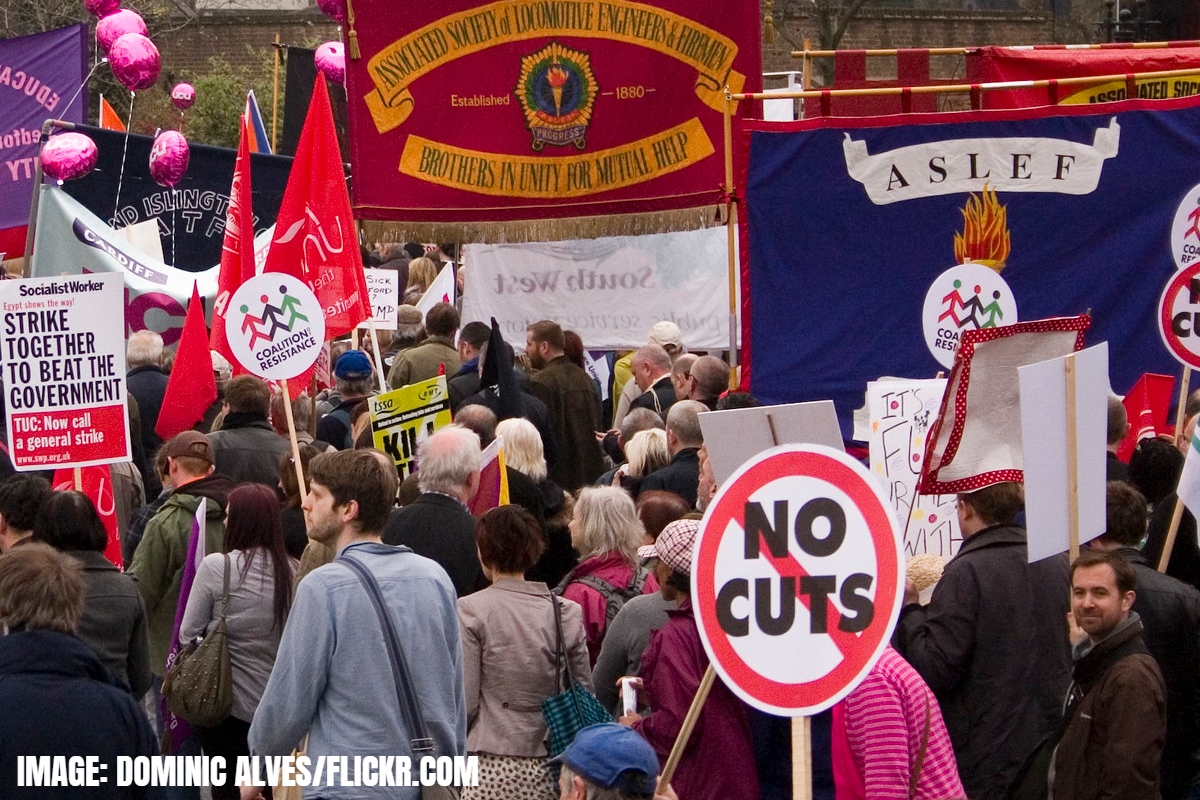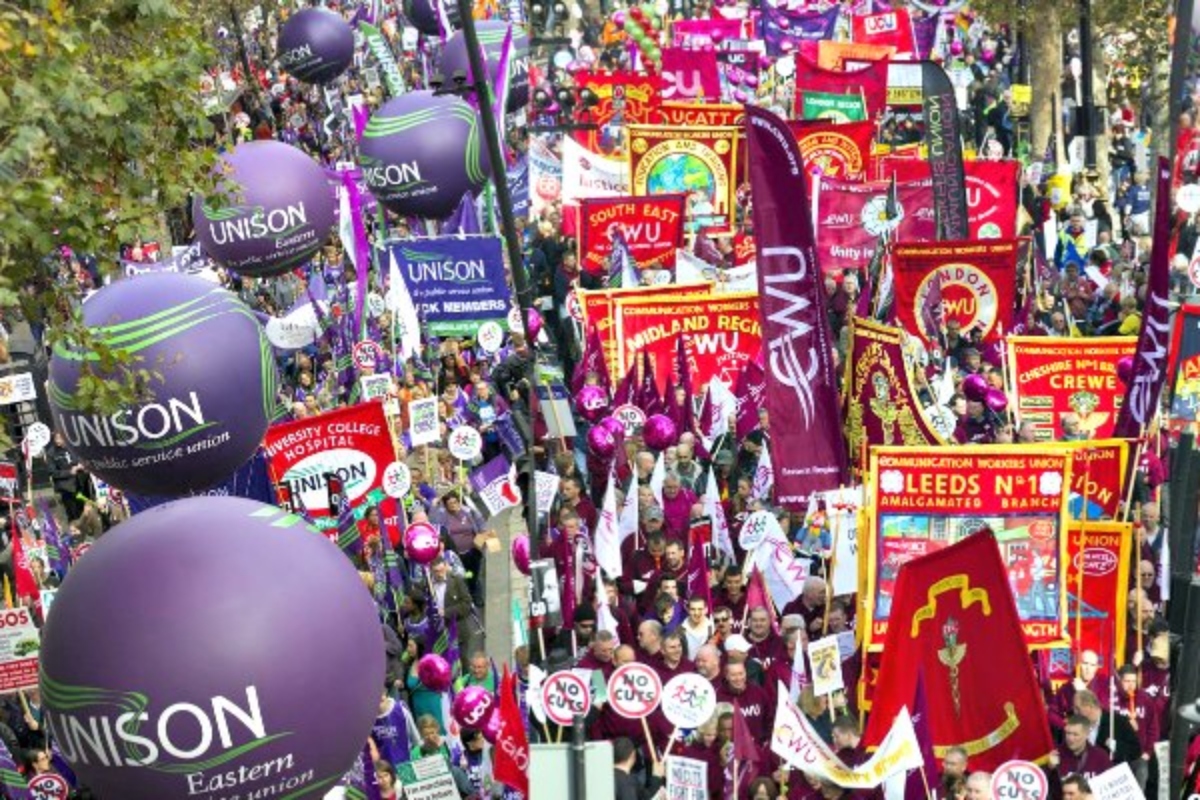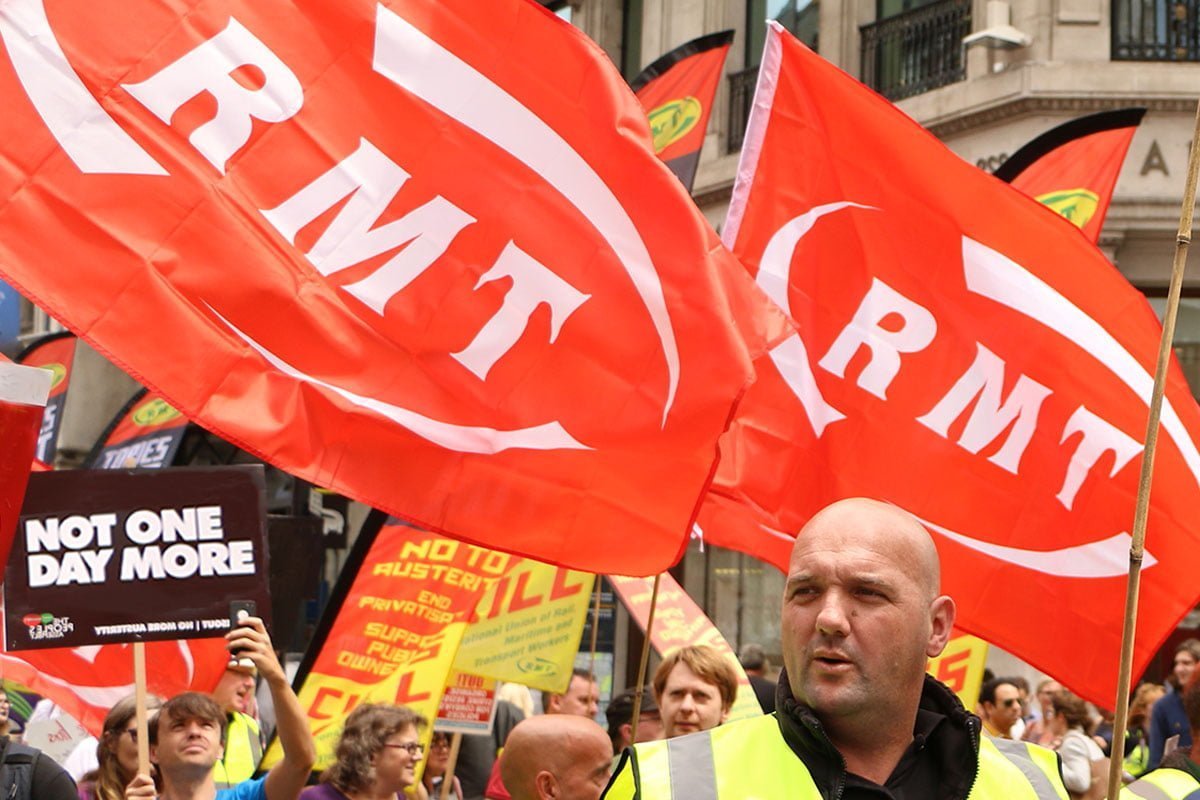The rail unions are moving closer towards a national strike, with major ballots underway. With coordinated action, such a strike would present a serious challenge to the Tories, and an opportunity to fight for nationalisation and workers’ control.
The RMT has announced two major ballots for strike action early in the new year. 13,000 Transport for London (TfL) workers will be balloted combined with a ‘campaign for a massive yes vote’. This is alongside 50,000 Network Rail and train operating company workers who are also set to be balloted.
This is a welcome development. It has the potential to mount a serious challenge to the Tories – and the bosses and bankers they represent.
Onslaught
 As we have previously reported, the rail sector is facing an onslaught on two fronts: From the government on the one hand; and the bosses of the private rolling stock, train and freight companies (ROSCOs, TOCs and FOCs) on the other.
As we have previously reported, the rail sector is facing an onslaught on two fronts: From the government on the one hand; and the bosses of the private rolling stock, train and freight companies (ROSCOs, TOCs and FOCs) on the other.
This threatens – and has already resulted in – further job cuts, pay freezes, pension cuts, longer working weeks, and worse safety conditions. This is alongside increased fares and depleted services for commuters.
The Tories are spurred on by the need to balance their budgets, after spending £340bn throughout the pandemic to keep capitalism afloat. And the bosses are driven by the need to redress their profits.
Both seek to make us workers pay for their crisis, however detrimental it may be to the railway service.
These attacks are reminiscent of those imposed by Thatcher in the 1980s. The ruling class then attempted to increase the short-term profitability of British capitalism by driving down the conditions of the working-class, regardless of the consequent annihilation of British manufacturing.
Similarly today, the railways require massive investment and centralised planning. But this cannot be afforded by a system where the short-sighted search for profits prevails.
It is an indictment on the present system indeed when even business organisations such as the London Chamber of Commerce and Industry and London First have joined the calls against the cuts because of the detrimental effect on big business.
But Boris Johnson – the Tory leader who infamously uttered the words “F*** business” – is proceeding in the opposite direction, along the path of privatisation and cuts.
Showdown
 In doing so, Boris is also intent on taking the militant rail unions head on in the process. The RMT is correctly rising to the challenge.
In doing so, Boris is also intent on taking the militant rail unions head on in the process. The RMT is correctly rising to the challenge.
Not a train wheel turns without the permission of rail workers. The implications are therefore immense.
The strike would halt a significant part of the whole economy, turning it into a de-facto showdown between the Tories and workers. For this reason it has the potential to rally many other sections of the labour movement for coordinated action.
The mood already exists for coordinated action both inside and outside of the RMT. This was the prevailing mood at the recent RMT AGM, where general secretary Mick Lynch praised co-ordinated action at Stagecoach, as opposed to taking each company on ‘piecemeal’.
Lynch correctly stated that the way forward was “to join forces and fight as one, united body of workers”.
Sister unions
 In the other rail unions the rank and file is moving in the direction of strike action against the exact same conditions that the RMT is striking against.
In the other rail unions the rank and file is moving in the direction of strike action against the exact same conditions that the RMT is striking against.
In November, ASLEF, the train drivers’ union, returned a 99% ‘yes’ vote on a ballot for strike action to protect working conditions and pensions.
Last week, TSSA general secretary Manuel Cortes stated: “Let’s be crystal clear, any attempt to use compulsory redundancies will be seen as a declaration of war and trains will be coming to a halt.”
This is also true within the wider public sector. At the UCU strike march on 3 December in London, Tube strikers and Mick Lynch were received with lots of enthusiasm.
“We’re not going to win [these struggles] through lobbying, through sending circulars and letters,” Lynch stated in a speech. “We’re going to win it on the streets, on the picket lines, and through industrial action coordinated right across our movement.”
Meanwhile, there is seething discontent among teachers, council workers, NHS staff, and the civil service. In fact, the coming year could see a strike wave right across the public sector – a Spring of Discontent.
For coordinated action!
 For the success of the strike and to take the Tories head on, the demand for unity in action must therefore be acted on concretely.
For the success of the strike and to take the Tories head on, the demand for unity in action must therefore be acted on concretely.
The first step is to join up the rail unions locally through committees of action. These could then be linked up nationally to build mass support for a coordinated strike in all workplaces across the rail industry.
This can then be used as a springboard to call on other sectors to join in the struggle, while calling on the TUC to be used as a genuine tool for coordination across different industries.
The central question would then become: what are the demands of the strike? What we are defending is clear: our pensions, safety, jobs, pay, and conditions. All of these demands can certainly be won.
But if the Tories in Westminster and profit-driven managers in the workplace remain in power, it will not be long until they go onto the offensive again.
Even under the agreements that are reached, they will look to cut corners and costs at our expense. After all, it is the current arrangements negotiated with the unions that are being torn to shreds.
A strike on this scale – cross-union, linked up nationally – will naturally pose the question of who runs (or should run) society: the Tories and the bosses, or the workers?
For nationalisation and workers’ control!
If we have the power to grind our industry to a halt, then we also have the power to run it. If the bosses have the incentive to run our industry into the ground, then they should not have the power to control it.
Our demands must therefore stop nowhere short of workers’ control and nationalisation – without compensation – of the TOCs, FOCs and ROSCOs. These companies extracted £1.3bn in private profits in the pandemic year alone that will not be reinvested in the railways.
Only by cutting off these parasites and deciding on our own budget can we save the railways and transform them into a quality public service for all to use.
- Support the ‘Yes’ vote!
- For coordinated action – link up the rail unions!
- Fight for nationalisation and workers’ control!






